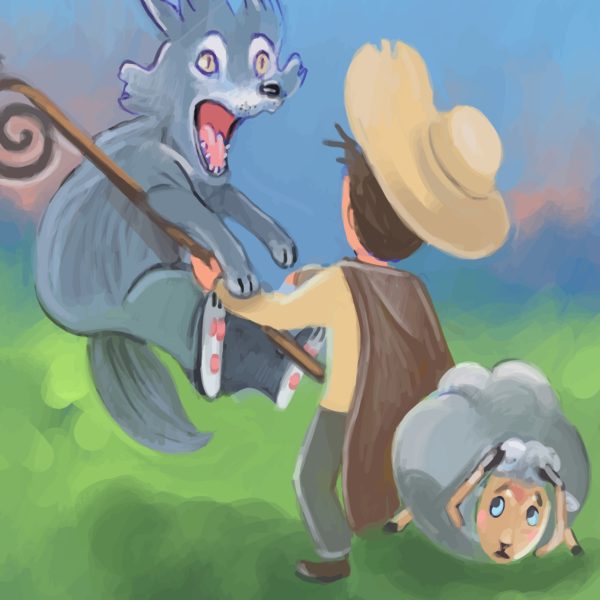There once was a shepherd boy who was bored as he sat on the hillside watching the village sheep. To amuse himself he took a great breath and sang out, «Wolf! Wolf! The Wolf is chasing the sheep!»
The villagers came running up the hill to help the boy drive the wolf away. But when they arrived at the top of the hill, they found no wolf. The boy laughed at the sight of their angry faces.
«Don’t cry ‘wolf, shepherd boy,» said the villagers, «when there’s no wolf!» They went grumbling back down the hill.
Later, the boy sang out again, «Wolf. Wolf. The wolf is chasing the sheep!» To his naughty delight, he watched the villagers run up the hill to help him drive the wolf away.
When the villagers saw no wolf they sternly said, «Save your frightened song for when there is really something wrong! Don’t cry ‘wolf when there is NO wolf»
But the boy just grinned and watched them go grumbling down the hill once more.
Later, he saw a REAL wolf prowling about his flock. Alarmed, he leaped to his feet and sang out as loudly as he could, «Wolf Wolf»
But the villagers thought he was trying to fool them again, and so they didn’t come.
At sunset, everyone wondered why the shepherd boy hadn’t returned to the village with their sheep. They went up the hill to find the boy. They found him weeping.
«There really was a wolf here! The flock has scattered! I cried out, «Wolf» Why didn’t you come?»
An old man tried to comfort the boy as they walked back to the village.
«We’ll help you look for the lost sheep in the morning,» he said, putting his arm around the youth, «Nobody believes a liar. even when he is telling the truth!»
Жил был когда-то пастух, которому было скучно, когда он сидел на склоне холма, наблюдая отарой овец. Для того, чтобы развлечь себя, он взял набрал в легкие много воздуха и запел, «Волк! Волк! Волк гонится за овцой!»
Жители деревни побежали на холм, чтобы помочь мальчику прогнать волка прочь. Но когда они собрались на вершине холма, они не нашли волка. Мальчик рассмеялся, когда увидел их сердитые лица.
«Не кричи ‘Волк’, когда нет никакого волка!» сказали емусельские жители, и они ушли ворча обратно вниз по склону.
Позже, мальчик началь петь снова, «Волк. Волк. Волк гонится за овцами!». К его восторгу, он опять наблюдал, как жители бегуть в гору, чтобы помочь ему справиться с волком.
Когда сельские жители еще раз не увидели волка они строго сказали: «Прибереги песню про опасность для случая, когда действительно что-то не так! Не кричи Волк, когда его нет».
Позже, мальчик увидел настоящего волка, который тащит в своей пасти овцу. Встревоженный, он вскочил на ноги и запел так громко, как он мог, «Волк, Волк»
Но жители думали, что он пытается обмануть их снова, и поэтому решили не идти.
На закате, жители задавались вопросом, почему пастушок не вернулся в деревню со своими овцами. Они поднялись на холм, чтобы найти мальчика. Они нашли его плачущим.
Один старик пытался успокоить мальчика, когда они шли обратно в деревню.
«Мы поможем тебе найти погибших овец утром,» сказал он, положив руку на юношу, «Запомни: Никто не верит, лжецу. даже когда он говорит правду!».
Поделиться ссылкой на эту страницу в любимой соцсети:
Англо-русский словарь онлайн 
5 тестов скорости!
English2017
Английский для всех простым языком
Мальчик, который кричал «волки» на английском языке — The Boy Who Cried Wolf — рус/eng
Существует несколько версий на английском языке истории про мальчика, который кричал «Волки».
Здесь, я публикую два коротких текста для детей и два более полных для взрослых.
The shepherd-boy and Wolf
The Wolf, however, did truly come at last. The Shepherd-boy, now really alarmed, shouted in an agony of terror: «Pray, do come and help me; the Wolf is killing the sheep»; but no one paid any heed to his cries, nor rendered any assistance. The Wolf, having no cause of fear, at his leisure lacerated or destroyed the whole flock.
There is no believing a liar, even when he speaks the truth.
Перевод
Но однажды Волк действительно пришел. Мальчик-пастух, действительно встревоженный, крикнул в ужасе: «Молитесь, придите помогите мне; Волк убивает овец »; но никто не обращал внимания на его крики и не оказывал никакой помощи. Волк, не имея причин для страха, в итоге разорвал или уничтожил все стадо.
Мораль: Нет веры в лжеца, даже когда он говорит правду.
Версия № 2
One day as he sat watching the sheep and the quiet forest, and thinking what he would do should he see a wolf, he thought of a plan to amuse himself.
His master had told him to call for help should a wolf attack the flock, and the villagers would drive it away. So now, though he had not seen anything that even looked like a wolf, he ran toward the village shouting at the top of his voice, «Wolf! Wolf!»
As he expected, the villagers who heard the cry dropped their work and ran in great excitement to the pasture. But when they got there they found the boy doubled up with laughter at the trick he had played on them.
A few days later the Shepherd Boy again shouted, «Wolf! Wolf!» Again the villagers ran to help him, only to be laughed at again.
Then one evening as the sun was setting behind the forest and the shadows were creeping out over the pasture, a Wolf really did spring from the underbrush and fall upon the Sheep.
In terror the boy ran toward the village shouting «Wolf! Wolf!» But though the villagers heard the cry, they did not run to help him as they had before. «He cannot fool us again,» they said. The wolf killed a great many of the boy’s sheep and then slipped away into the forest.
Перевод
Однажды, когда он сидел, наблюдая за овцами и тихим лесом и думая, что он будет делать, если увидит волка, он придумал план как ему развлечься.
Его хозяин сказал ему, если нагрянет волк, то пусть мальчик кричит о помощи, тогда жители придут и спасут его. И хотя он не увидел ничего похожего на волка, он побежал к деревне, крича во весь голос: «Волк! Волк!»
Как и ожидалось, жители деревни, услышавшие крик, бросили свою работу и с большим волнением побежали на пастбище. Но когда они прибежали, поняли, что мальчик смеялся над тем. что сумел пошутить над ними.
Через несколько дней мальчик-пастух снова закричал: «Волк! Волк!» Опять жители деревни побежали, чтобы помочь ему, и снова были осмеяны мальчиком.
Однажды вечером, когда солнце садилось за лес, а тени падали на пастбище, Волк действительно выпрыгнул из подлеска и напал на овец.
Версия притчи № 3
One afternoon the boy decided to play a trick on the villagers. “Wolf! Wolf!” he cried. “There’s a wolf chasing the sheep!”
The villagers raced up the hill to chase the wolf away, but there was no wolf in sight. “Don’t cry ‘wolf’ when there is no wolf!” they warned the boy.
The boy was surprised his trick worked so well. “I can’t believe he played a trick like that!” the villagers grumbled as they stormed down the hill.
The next day the boy tried his trick again. “Wolf! Wolf!” he called out. “There’s a wolf chasing the sheep!”
The villagers came running and again found no wolf. “Don’t do this again!” they scolded. “Only cry ‘wolf’ when there actually is a wolf!”
A few hours later, the boy noticed something out of the corner of his eye. A wolf was sneaking up behind the sheep! “Wolf! Wolf!” he cried in a panic.
No one came. “Wolf! Wolf!” he cried again. “Please help! There’s a wolf chasing the sheep!” Still no one came.
At sunset, the boy did not return the sheep to the village as he normally did. The villagers went up the hill to check on the sheep. They found the boy but no sheep.
“A wolf was here! It chased the sheep away! Why didn’t you come to help me?” he cried. “You tricked us twice when there was no wolf. We thought you were tricking us again!” said the villagers.
“I shouldn’t have cried ‘wolf’ when there was no wolf,” said the boy. “I’m sorry for my tricks.”
An old man comforted the boy. “If you tell too many lies, no one believes you when you tell the truth,” he said. “Now let’s go find those sheep.”
Перевод
Однажды днем мальчик решил сыграть шутку с жителями деревни. «Волк! Волк! — воскликнул он. «Волк охотиться за овцами!»
Жители деревни мчались вверх по холму, чтобы прогнать волка, но его не было видно. «Не кричи « волк », когда нет волка!» — предупредили они мальчика.
Мальчик был удивлен, что его трюк сработал так хорошо. «Не можем поверить, что он над нами подшутил!» — проворчали жители деревни, когда они бегали по холму.
На следующий день мальчик снова попробовал пошутить. «Волк! Волк! — крикнул он. «Волк охотится за овцами!»
Жители деревни прибежали и снова не нашли волка. «Больше так не делай!» — ругались они. «Кричи « волк », только тогда, когда он на самом деле есть!»
Несколько часов спустя мальчик заметил что-то краем глаза. Волк прокрался к овцам! «Волк! Волк! — закричал он в панике.
Но никто не пришел. «Волк! Волк! — снова закричал он. «Пожалуйста помогите! Там волк охотится за овцами! » Но никто не пришел.
На закате мальчик не вернул овец в деревню, как это было обычно. Жители деревни поднялись на холм, чтобы проверить овец. Но там они увидели мальчика, но не овец.
«Волк был здесь! Он охотился за овцми! Почему вы не пришли мне на помощь? — воскликнул он. «Ты обманул нас дважды, когда не было волка. Мы думали, что ты снова обманываешь нас! »- сказали жители деревни.
«Я не должен был кричать « волк », когда не было волка, — сказал мальчик. «Прошу прощения за свои шутки».
Старик успокоил мальчика. «Если ты много врешь, никто не поверит тебе, когда ты говоришь правду», — сказал он. «Пойдем, найдем этих овец».
Версия № 4
But Peter was too easily bored, and he found it very tiresome being on the hillside with only sheep for company. So he’d find ways to amuse himself, running up rocks, climbing trees, chasing sheep, but nothing really kept him amused for very long. Then he hit upon a brilliant idea. He climbed to the top of the tallest tree, and started shouting towards the village: “Wolf! Wolf! Wooolf! Woohoolf!”
One of the villagers heard him, and got all the other men together, and armed with axes, hoes and forks, they ran out of the village to chase away the wolf and save their herd. Of course when they got there, they merely found Peter perched high up in his tree, laughing, and the sheep grazing peacefully. They were very annoyed with him. That night Peter got a spanking from his mother and was sent to bed without any supper.
For a while life went on again as normal, and people forgot about the incident. Peter managed to behave himself whenever it was his turn to mind the sheep. Until one day, he got really bored again. He picked up some sticks, and running through where the sheep were grazing, he started hitting the sticks together, and shouting: “Wolf! Wolf! Wooolf! Woohoolf! Woohoohoooolf!”
Sure enough, somebody in the village heard and before long the men all come running up the hill armed with their sticks and axes and hoes and shovels, ready to chase away the big bad wolf, and save their sheep and the poor shepherd boy. Imagine their consternation when they arrived in the field to see their herd grazing peacefully, and Peter sitting on a big rock, laughing uncontrollably.
That night Peter got a good telling off, an even better spanking from his mother, and was again sent to bed without any supper. For a few days people in the village went around moaning about Peter and his tricks, but before long things settled down again, and life resumed its normal uneventful course, and Peter had to do his turn at shepherding again every now and then. He decided he should behave himself, he really didn’t want to upset everybody all the time, and he especially didn’t want another one of his mother’s spankings!
Then, one afternoon when Peter was in the fields with the sheep, he noticed some of them were getting nervous, they started bleating and running hither and thither. Peter didn’t know what was the cause of this strange behaviour, sheep were running all over and making an ever louder racket. He got worried and decided to climb a tree so he could see what was going on. He balanced on a sturdy branch and looked around, what he saw almost made him fall out of the tree. There was a great big hairy wolf, chasing the sheep, biting at their legs, snapping at their tails. For a few seconds Peter was speechless. Then he started shouting: “Woolf! Woolof! Woohoohooloof!”
In the village an old man heard the shouting. “Oh no, not that Peter again”, he said, shaking his head. “What’s going on?” enquired another villager. “It’s that Peter again, he just can’t help himself”.
“That boy needs to be the centre of attention all the time”, said another. “Wait till his mother gets a hold of him”, added yet another. Nobody believed that this time there really was a wolf, and nobody got their hoe out, or their axe, or their shovel. All the sticks were left in the sheds and nobody rushed up the hillside. It wasn’t until very much later that afternoon, that the boy sent to take over the shepherding from Peter found dead sheep’s bodies strewn all over the hillside, and Peter still up there in his tree, whimpering, that the villagers found out there really had been a wolf this time.
At last Peter learnt his lesson, that if you always tell lies, people will eventually stop believing you; and then when you’re telling the truth for a change, when you really need them to believe you, they won’t.
Перевод
Но Питеру это слишком быстро надоело, ему было очень утомительно находиться на склоне холма в компании овец. И он нашел способы развлечь себя, бегать по скалам, лазать по деревьям, гонять овец, и ничто не мешало ему очень долго развлекаться. Затем его осенила блестящая идея. Он поднялся на вершину самого высокого дерева и начал кричать в сторону деревни: «Волк! Волк! Wooolf! Woohoolf!»
Один из жителей деревни услышал его, собрал всех других людей, вооружившись топорами, мотыгами и вилами, они выбежали из деревни, чтобы прогнать волка и спасти свое стадо. Конечно, когда они добрались туда, они поняли, что Питер сидит высоко в своем дереве, смеется, а овцы мирно пасутся. Они были очень рассержены на него. В этот вечер Питер получил порку от матери и был отправлен спать без ужина.
Некоторое время жизнь продолжалась как обычно, и люди забыли об этом инциденте. Питеру приходилось держать себя в руках, всякий раз, когда ему приходилось смотреть за овцами. Но это продолжалось ровно до тех пор, пока ему снова не стало скучно. Он взял палки и побежал туда, где пасутся овцы, начал бить палками и кричать: «Волк! Волк! Wooolf! Woohoolf! Woohoohoooolf!»
Конечно, кто-то в деревне услышал, и вскоре люди подбежали к холму, вооруженные палками и топорами, мотыгами и лопатами, готовые выгнать прогнать волка и спасти своих овец и бедного мальчика-пастуха. Представьте себе их ужас, когда они прибежали на поле, и увидели, как их стадо мирно пасется, а Питер сидит на большой скале, неудержимо смеясь.
В этот вечер Питер получил хороший нагоняй и хорошую порку от своей матери, после чего снова был отправлен спать без ужина. Несколько дней люди в деревне ворчали над шутками Питера, но вскоре все снова успокоилось, и жизнь возобновила свой обычный естественный ход, и Питеру приходилось снова и снова пасти овец. Он решил, что должен себя вести хорошо, ведь он действительно не хотел постоянно всех расстраивать, а особенно он не хотел получить от матери порцию взбучки!
Однажды днем, когда Петр был на поле с овцами, он заметил, что некоторые из них нервничали, они начали блеять и бегать туда-сюда. Питер не знал, в чем причина этого странного поведения, овцы бегали повсюду и блеяли все громче. Он волновался и решил подняться на дерево, чтобы он мог видеть, что происходит. Он сидел на крепкой ветке и оглядывался вокруг, и он увидел то, что, его заставило упасть с дерева. Огромный волк, преследующий овец, кусающий ноги и хватающий хвосты. В течение нескольких секунд Питер потерял дар речи. Затем он начал кричать: «Волк! Woolof! Woohoohooloof!»
В деревне старик услышал крики. «О нет, это опять Питер», — сказал он, покачав головой. «Что происходит?» — спросил еще один сельский житель. «Это снова Питер, он не сможет помочь себе».
«Этот мальчик все время должен быть в центре внимания», — сказал другой. «Подождите, пока его мать не схватит его», добавил еще один. Никто не верил, что на этот раз действительно был волк, и никто не взял мотыгу, топор, или лопату. Все палки остались в сараях, и никто не бросился вверх по склону. Закончилось тем, что вечером отправили мальчика подменить Питера и нашли мертвые тушки овец, разбросанные по всему склону холма. Там же был и Питер, на дереве, хныкая. Жители деревни увидели, что на этот раз волк действительно был.
Наконец-то Питер усвоил урок, что, если вы всегда лжете, люди перестанут верить вам; и тогда, когда вы говорите правду о каких-то изменениях, когда вам действительно нужно, чтобы вам поверили, вам не поверят.
The Boy Who Cried Wolf
Aesop’s famous story has worked its way into the English Language. The dictionary says that to cry wolf is to ‘ask for help when you do not need it, with the result that no one believes you when help is necessary.’
In this Storynory version the boy is now an old man, and he looks back on the joke that went badly wrong and landed him with a reputation for silly pranks. It’s a real shorty – but we hope you will enjoy it – and we think it’s quite moving.
Read by Natasha. Duration 6.07
Proofread by Claire Deakin & Jana Elizabeth.
When I was a lad, my father used to send me out to the fields each day to watch over his sheep. Hey now! There are worse jobs than sitting out in the fresh air all day, but it was boring work for a lad. I longed to be running around with my friends, playing ball, or making boyish mischief.
“Can’t the sheep look after themselves?” I asked my father. “After all, they know how to bleat and munch grass, but there isn’t much else that they do.”
Father said it was important work, and most importantly of all, I must keep my eyes peeled for the wolf – in case he came sneaking into the fields and grabbed one of the spring lambs.
I couldn’t even go to sleep. I had to sit and keep a sharp look out. After a few weeks of this, I got so bored that I began to wish that the wolf would show up and give me something to do.
Then I got thinking to myself: “Let’s liven things up a bit,” I thought. “Let’s play a trick on the villagers.” So I got up and ran as fast as I could into the village shouting at the top of my voice: “Wolf! Wolf! WOOOOOOOOLF!”
The villagers grabbed sticks, rolling pins, and pitchforks and came running up to the field to chase away the wolf.
But when they got there, all was peaceful. The lambs were frolicking as usual, quite unmolested.
I laughed: “Ha ha! Fooled you all!”
None of the villagers laughed with me. Some of them grumbled and the blacksmith became quite angry and shouted at me – but he was just a bad sport who couldn’t see the funny side of my joke.
A week later I did the same thing again, only this time I put on an even better act. I daubed red paint on my arm, and pretended that the wolf had bitten me. This fooled even the blacksmith, who was on his guard after the last trick I had played.
When they all arrived breathless in the field, I again called out: “Ha ha! Fooled you!”
This time, quite a few of the villagers were angry with me, and I got quite an ear-wigging from the blacksmith, the teacher, and the iron-monger. When I got home, my father was furious and told me that I had a stupid sense of humour. But I thought it was funny – and so did my friends.
About a week after that, I was sitting up on the hill watching my father’s sheep as usual. It was getting on for evening, and the sun was setting behind the forest. I would have to spend the night out there, and oh, how lonely and bored was I. Then all of a sudden the sheep dogs started to bark and the flock was running around and bleating like they had all gone mad. Only they hadn’t; there was a wolf among the sheep and he had seized a lamb.
“Wolf! Wolf! WOOOOOOOOOOOOOOLF!” I called out and I ran into the village to get help.
But nobody came. Not one villager. They carried on doing whatever they were doing. Eating supper, drinking ale, or finishing off their work for the day.
“Please,” I said to the blacksmith. “This time it’s true. There really is a wolf.” But he just shrugged his shoulders.
You see nobody believes a liar, even when he’s speaking the truth… And that’s why you should never cry wolf unless you really mean it.
Сценарий сказки The boy who cried “Wolf!” (Мальчик, который кричал «Волки!») на английском языке
специалист в области арт-терапии
Сценарий сказки The boy who cried “Wolf!” (Мальчик, который кричал «Волки!») на английском языке
The boy who cried “Wolf!”
He had a joke which he often played on the people. (Мальчик оглядывается по сторонам)
(Прибегают соседи с палками)
The neighbors ran very fast to him because they wanted to save his life. But when they came the boy laughed at them( Мальчик смеется ). He was playing the same trick again and again.
Your nose is long as a telephone wire!
(Соседи уходят, мальчик смотрит по сторонам, а затем кричит)
(Прибегают соседи с палками)
Your nose is long as a telephone wire!
(Соседи повернулись на крик, но не встают)
Сценарий на английском языке сказки «Мальчик, который кричал «Волки!» подойдет для театрализированного представления в рамах реализации внеурочной деятельности или для внеклассного мероприятия. Сказка на английском языке The boy who cried “Wolf!(Мальчик, который кричал «Волки!») сможет заинтересовать детей, и поможет запомнить простые слова на английском.
Номер материала: ДБ-1617104
Не нашли то что искали?
Вам будут интересны эти курсы:
Оставьте свой комментарий
Подарочные сертификаты
Ответственность за разрешение любых спорных моментов, касающихся самих материалов и их содержания, берут на себя пользователи, разместившие материал на сайте. Однако администрация сайта готова оказать всяческую поддержку в решении любых вопросов, связанных с работой и содержанием сайта. Если Вы заметили, что на данном сайте незаконно используются материалы, сообщите об этом администрации сайта через форму обратной связи.
Все материалы, размещенные на сайте, созданы авторами сайта либо размещены пользователями сайта и представлены на сайте исключительно для ознакомления. Авторские права на материалы принадлежат их законным авторам. Частичное или полное копирование материалов сайта без письменного разрешения администрации сайта запрещено! Мнение администрации может не совпадать с точкой зрения авторов.












